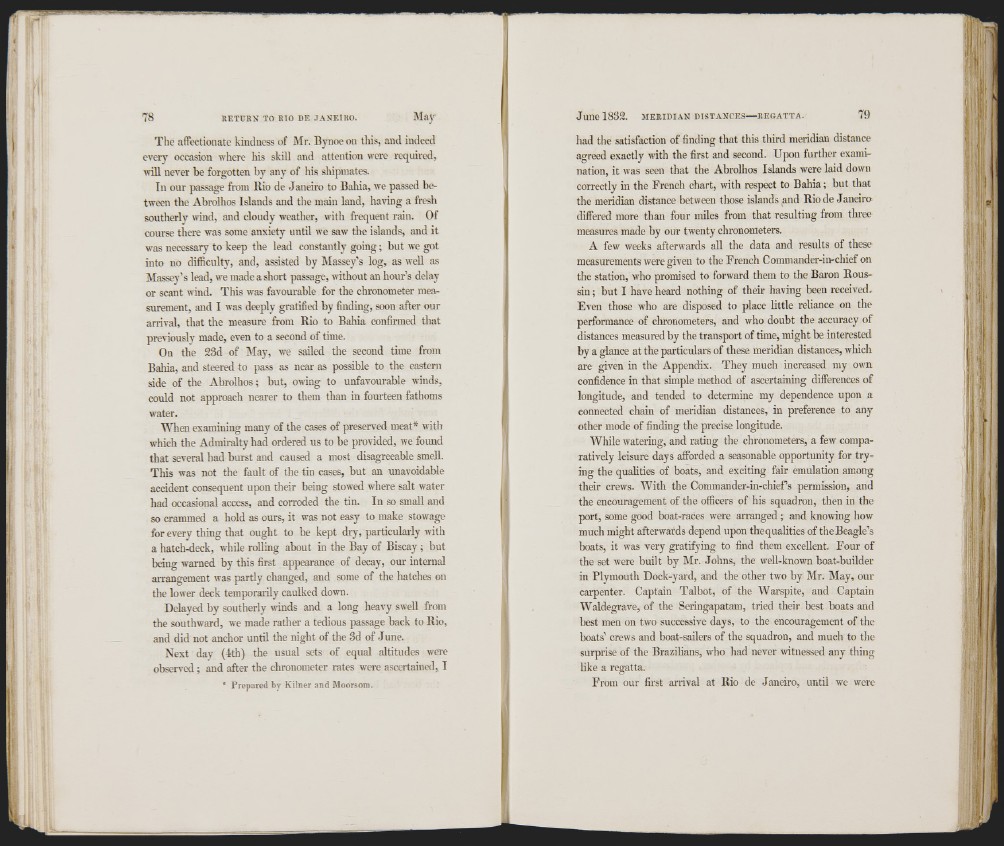
■ 1
RETURN TO RIO DE .TANKIKO. Mav
I t
The affectionate kindness of Mr. Bynoe on this, and indeed
every occasion where his skill and attention were required,
win never be forg-otten by any of his shipmates.
In our passage from Rio de Janeiro to Bahia, we passed between
the Abrolhos Islands and the main land, having a fresh
southerly wind, and cloudy weather, with frequent rain. Of
course there was some anxiety until we saw the islands, and it
was necessary to keep the lead constantly going; but we got
into no difficulty, and, assisted by Massey’s log, as well as
Massey’s lead, we made a short passage, without an hour’s delay
or scant wind. This was favourable for the chronometer measurement,
;md I was deeply gratified by finding, soon after our
arrival, that the measure from Rio to Bahia confirmed that
previously made, even to a second of time.
On the 23d of IMay, we sailed the second time from
Balua, and steered to pass as near as possible to the eastern
side of the Abrolhos; hut, owing to unfavourable winds,
could not approach nearer to them than in fourteen fathoms
water.
When examining many of the cases of preserved meat* with
which tlie Admii-alty had ordered us to be provided, we fomid
that several had burst and caused a most disagreeable smell.
This was not the fault of the tin cases, but an unavoidable
accident consequent upon their being stowed where salt water
had occasional access, and corroded the tin. In so small and
so crammed a hold as ours, it was not easy to make stowage
for every thing that ought to be kept dry, particulaily with
a hatch-deck, while rolling about in the Bay of Biscay ; but
being warned by this first appearance of decay, our internal
arrangement was partly changed, and some of the hatches on
the lower deck temporarily caulked down.
Delayed by southerly winds and a long heavy swell from
the southward, we made rather a tedious passage hack to Rio,
and did not anchor until the night of the 3d of June.
Next day (4th) the usual sets of equal altitudes were
observed ; and after the chronometer rates were ascertained, I
• Prepared by Kilner and Bioorsoni.
Ii
June 1832. m e r i d i a n d i s t a n c e s— r e g a t t a . 79
had the satisfaction of finding that this third meridian distance
agreed exactly with the first and second. Upon further examination,
it was seen that the Abrolhos Islands were laid down
correctly in the French chart, with respect to Bahia; but that
the meridian distance between those islands and Rio de Janeiro
differed more than four miles from that resulting from three
measures made by our twenty chronometere.
A few weeks afterwards all the data and results of these
measurements were given to the French Commander-in-chief on
the station, who promised to forward them to the Baron Rous-
sin; but I have heard nothing of theft having been received.
Even those who are disposed to place little reliance on the
performance of chronometers, and who doubt the accuracy of
distances measured by the transport of time, might be interested
by a glance at the particulai-s of these meridian distances, which
ai-e given in the Appendix. They much increased my own
confidence in that simple method of ascertaining differences of
longitude, and tended to determine my dependence upon a
connected chain of meridian distances, in preference to any
other mode of finding the precise longitude.
AVhile watering, and rating the chronometers, a few comparatively
leisure days afforded a seasonable opportunity for trying
the qualities of boats, and exciting fair emulation among
their crews. AA’^ith the Commander-in-chief’s permission, and
the encouragement of the officers of his squadron, then in the
port, some good boat-races were arranged ; and knowing how
much might afterwards depend upon thequalities of the Beagle’s
boats, it was very gratifying to find them excellent. Four of
the set were built by Mr. Johns, the well-known boat-builder
in Plymouth Dock-yard, and the other two by Mr. May, our
carpenter. Captain Talbot, of the Warspite, and Captain
AValdegrave, of the Seringapatam, tried their best boats and
best men on two successive days, to the encouragement of the
boats’ crews and boat-sailers of the squadron, and much to the
surprise of the Brazilians, who had never witnessed any thing
like a regatta.
From our first arrival at Rio de Janeiro, until we were
H‘ll
‘i;
f#j 1111'
fi I't
Idii
i fi